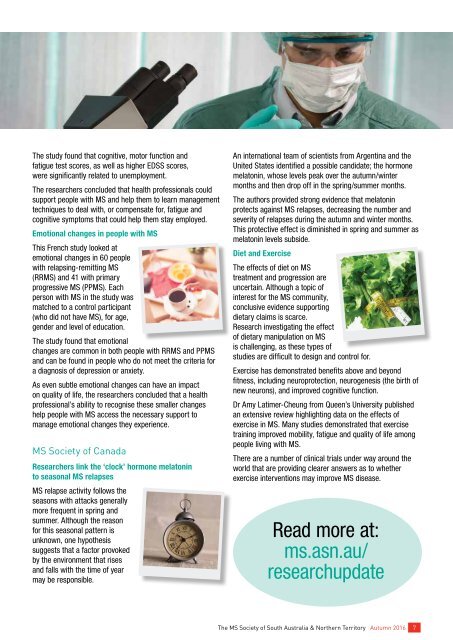Create successful ePaper yourself
Turn your PDF publications into a flip-book with our unique Google optimized e-Paper software.
The study found that cognitive, motor function and<br />
fatigue test scores, as well as higher EDSS scores,<br />
were significantly related to unemployment.<br />
The researchers concluded that health professionals could<br />
support people with MS and help them to learn management<br />
techniques to deal with, or compensate for, fatigue and<br />
cognitive symptoms that could help them stay employed.<br />
Emotional changes in people with MS<br />
This French study looked at<br />
emotional changes in 60 people<br />
with relapsing-remitting MS<br />
(RRMS) and 41 with primary<br />
progressive MS (PPMS). Each<br />
person with MS in the study was<br />
matched to a control participant<br />
(who did not have MS), for age,<br />
gender and level of education.<br />
The study found that emotional<br />
changes are common in both people with RRMS and PPMS<br />
and can be found in people who do not meet the criteria for<br />
a diagnosis of depression or anxiety.<br />
As even subtle emotional changes can have an impact<br />
on quality of life, the researchers concluded that a health<br />
professional’s ability to recognise these smaller changes<br />
help people with MS access the necessary support to<br />
manage emotional changes they experience.<br />
MS Society of Canada<br />
Researchers link the ‘clock’ hormone melatonin<br />
to seasonal MS relapses<br />
MS relapse activity follows the<br />
seasons with attacks generally<br />
more frequent in spring and<br />
summer. Although the reason<br />
for this seasonal pattern is<br />
unknown, one hypothesis<br />
suggests that a factor provoked<br />
by the environment that rises<br />
and falls with the time of year<br />
may be responsible.<br />
An international team of scientists from Argentina and the<br />
United States identified a possible candidate; the hormone<br />
melatonin, whose levels peak over the autumn/winter<br />
months and then drop off in the spring/summer months.<br />
The authors provided strong evidence that melatonin<br />
protects against MS relapses, decreasing the number and<br />
severity of relapses during the autumn and winter months.<br />
This protective effect is diminished in spring and summer as<br />
melatonin levels subside.<br />
Diet and Exercise<br />
The effects of diet on MS<br />
treatment and progression are<br />
uncertain. Although a topic of<br />
interest for the MS community,<br />
conclusive evidence supporting<br />
dietary claims is scarce.<br />
Research investigating the effect<br />
of dietary manipulation on MS<br />
is challenging, as these types of<br />
studies are difficult to design and control for.<br />
Exercise has demonstrated benefits above and beyond<br />
fitness, including neuroprotection, neurogenesis (the birth of<br />
new neurons), and improved cognitive function.<br />
Dr Amy Latimer-Cheung from Queen’s University published<br />
an extensive review highlighting data on the effects of<br />
exercise in MS. Many studies demonstrated that exercise<br />
training improved mobility, fatigue and quality of life among<br />
people living with MS.<br />
There are a number of clinical trials under way around the<br />
world that are providing clearer answers as to whether<br />
exercise interventions may improve MS disease.<br />
Read more at:<br />
ms.asn.au/<br />
researchupdate<br />
The MS Society of South Australia & Northern Territory <strong>Autumn</strong> <strong>2016</strong> 7


















